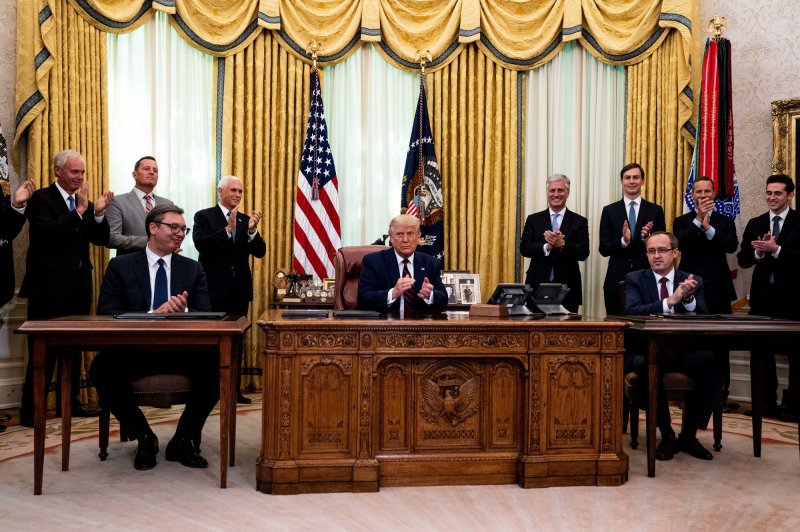1 of 2 | President Donald Trump participates in a signing ceremony and meeting with Serbian President Aleksandar Vucic (L) and the Kovovo Prime Minister Avdullah Hoti, in the Oval Office of the White House on September 4. Pool Photo by Anna Moneymaker/UPI |
License Photo
WASHINGTON, Feb. 19 (UPI) -- With left-wing politician Albin Kurti elected prime minister of Kosovo last weekend, U.S. President Joe Biden has congratulated the heads of state of both Kosovo and Serbia for their independence days in letters revealing how his approach to the region will be different from that of his predecessor.
The letters, sent to honor Serbia's independence from the Ottoman Empire in 1804 and Kosovo's independence from Serbia in 2008, urged the normalization of relations between the two countries, which have struggled to move past animosities from the bloody war in the region in the 1990s. Although most Western countries recognize Kosovo, Serbia and its allies Russia and China have yet to recognize the new country -- a point of contention in the Balkans.
"We remain steadfast in our support for Serbia's goal of European integration and encourage you to continue taking the hard steps forward to reach that aim -- including instituting necessary reforms and reaching a comprehensive normalization agreement with Kosovo centered on mutual recognition," Biden wrote to Serbian President Aleksandar Vučić earlier this month.
Biden also encouraged Kosovo to move toward normalization with Serbia based on mutual recognition -- the crux of the problem between the two countries -- in a letter with a markedly different tone.
"On a personal note," Biden wrote to acting President Vjosa Osmani this week, "Kosovo continues to hold a special place for the Biden family, in honor of the time our late son Beau Biden spent working to ensure peace, justice and the rule of law for all the people of Kosovo."
The president's son spent time in Kosovo as a legal adviser for the Organization for Security and Cooperation in Europe after the war ended in 1999, leaving such an impact that the country named a main highway after him following his death in 2015.
Joe Biden also spent time in the Balkans as a senator and vice president. He last visited the region as vice president in 2016 in a final push for normalization between Kosovo and Serbia. During the trip, he attended the naming ceremony of the Joseph R. "Beau" Biden III Highway in Kosovo, where he told the country, "I believe in you" and "we love you."
In contrast, Biden's meeting with Serbian leaders in Belgrade the day before the highway ceremony was marred by the presence of hundreds of ultranationalist protesters who marched throughout the city shouting "Donald Trump." Biden's visit came about a month after Trump had been nominated as the Republican presidential candidate, garnering support from pro-Russia populists in the country.
The Trump administration showed more willingness to work with Serbia than most previous administrations, said Engjellushe Morina, a Balkans expert at the European Council on Foreign Relations. Trump officials asked what can the United States get out of the region, rather than the past U.S. position of asking what is it that the United States can do to help the region, she said.
Trump organized a much anticipated peace summit with Vučić and then Kosovo Prime Minister Avdullah Hoti in the White House to move forward peace negotiations in September, overseen by Trump's special presidential envoy for peace negotiations between the countries, Ambassador Richard Grenell.
But the meeting resulted in the signing of two documents that included no legally binding agreements, Morina said, largely focusing on economic issues and extraneously normalizing relations with Israel instead of establishing mutual recognition between the two countries.
"That agreement is very dubious in terms of the substance," said Florian Bieber, professor of Southeast European history and politics at the Centre for Southeast European Studies at the University of Graz. "Without really putting details on paper, it's not going to matter much."
Bieber said it seems Trump sent Grenell to the region to score an easy foreign policy win before he was up for re-election.
After the summit, Trump sent letters to Vučić and Hoti urging them to take more concrete steps toward normalization. Trump's letters showed less sympathy than Biden's to the Kosovo cause.
"I appreciate and share your steadfast commitment to ensuring the stability and peace of the Balkans and the world," Trump wrote to Hoti. "I look forward to continuing to strengthen the partnership between our nations and send my best wishes to you and the people of Kosovo."
Trump's note to Vučić read more warmly: "I am heartened by your tremendous courage in beginning to normalize economic relations with Kosovo," Trump wrote, "and look forward to continuing to create a safer, stronger and more prosperous region. Best wishes to you and the great people of Serbia."
Despite Kurti's belief that Grenell played a role in the demise of his first coalition, Kurti has said that he does not hold a grudge against the United States and immediately tweeted congratulations to Biden after his inauguration.
Although Vucic has not made a public statement responding to Biden's most recent letter, Serbia's Minister of Foreign Affairs Nikola Selaković said this week that if the United States and other countries expect Belgrade to recognize Kosovo, they will not find the answer they are hoping for in Serbia.















